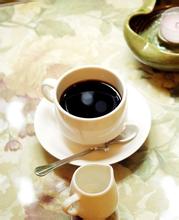Description of the flavor of thick and mellow civea coffee the characteristics of grindability treatment the introduction of manors in producing areas
Coffee beans generally go through the process of shell fermentation, coffee beans in the civets' intestines, special bacteria provide a unique fermentation environment, the flavor becomes unique, particularly thick and mellow. The coffee beans fermented by civets' intestines and stomach are very thick and mellow.
Eva, the owner of Special Cafe, is a coffee enthusiast who travels around the world every year in search of rare goods. She told reporters that the "Kopi Luwak" was once a tribute from Indonesia to the Dutch royal family. At that time, the industry regarded the coffee with the name of "cat shit" as a joke, and it was not until it was specially reported by National Geographic that people became interested in the Kopi Luwak.
The company M.P. Mountanos, which first introduced Kopi Luwak coffee to the United States, pointed out that at first, when I heard about this kind of coffee fermented in the body, I thought it was a joke in the industry, but I didn't take it seriously. later, I saw a special report on Kopi Luwak in National Geographic Magazine and became interested in her. it took seven years to find a stable source of supply and began to introduce a small amount to the United States. What's the flavor of this coffee? Generally speaking, Indonesian coffee has the taste of mud and traditional Chinese medicine, and its consistency is the highest in all continents, but Kopi Luwak has a stronger taste and consistency, which is almost close to syrup, and its flavor is very special. If you don't like Indonesian coffee in the first place, you must hate Kopi Luwak even more. If you prefer the fishy smell of aged beans, you may love this alternative coffee. Experts who have tasted Kopi Luwak have put forward a polarized evaluation, and some people compare it to the best coffee in the world. Although it is the best, but willing to spend thousands of yuan to drink a cup of Kopi Luwak, that is, it is said that coffee farmers in early Indonesia regard civets that specialize in ripe coffee fruits as mortal enemies. But I do not know when someone began to think of picking coffee beans from the civet droppings to make coffee with unique flavor. Coffee experts everywhere have tried and were amazed. Since then, during the coffee ripening season, local farmers spend a lot of time every day in the forest collecting civet feces, Kopi Luwak, produced in Indonesia, one of the most expensive coffee in the world. Indonesia grows a lot of coffee crops, including wild animals called civets, omnivores, pointed mouths and dark gray fur. The favorite food is fresh coffee beans, which are fermented and digested in the body and eventually excreted by cats. Feces are grains of coffee beans and become the most expensive feces in the world. Because the quantity is very rare, so the price is very expensive. Civets are distributed in Indo-China, India (northeast), Bangladesh, Bhutan, Sikkim, Nepal and Kashmir, but only Sumatran civets, or Indonesian civets, can produce Kopi Luwak.
"civets" are omnivores. They are withdrawn by nature and like to walk at night. They live in tropical rain forests, subtropical evergreen broad-leaved forests, mountain thickets or hills, mountains and grasses below 2000 meters above sea level. Its food includes small beasts, birds, amphibians and reptiles, crustaceans, fruits and seeds of insects and plants. The civet likes to choose the most mature, sweet, juicy coffee fruit in the coffee tree as food, while the coffee fruit passes through its digestive system and is digested only by the pulp on the outside of the fruit. The hard coffee beans are then excreted intact by the civets' digestive system. This is the "natural fermentation method" that was once scoffed by Americans. It is said that when Americans heard of such a way of making coffee, it was regarded as a fantasy, and it was not until it was reported by National Geographic magazine that they became interested in it.

Important Notice :
前街咖啡 FrontStreet Coffee has moved to new addredd:
FrontStreet Coffee Address: 315,Donghua East Road,GuangZhou
Tel:020 38364473
- Prev

Description of the Flavor of Jamaica Blue Mountain Coffee introduction to the method of manor treatment in the producing area of varieties
In 1950, the Government of Jamaica established the Jamaica Coffee Industry Committee (the Jamaica Coffee Industry Board), which sets quality standards for Jamaican coffee and oversees the implementation of quality standards to ensure the quality of Jamaican coffee. The committee awarded a special official seal to raw coffee and roasted coffee exported from Jamaica, which is the highest level of national coffee in the world.
- Next

Mellow and smooth Peruvian coffee flavor and taste characteristics introduction to the taste price of high-quality coffee beans in producing areas
Peruvian coffee is grown in a planned way, which has greatly increased coffee production. Its rich acidity and mellow smoothness are its most prominent features. Peruvian coffee has a soft sour taste, medium texture, good taste and aroma, and is an indispensable ingredient in the production of comprehensive coffee. Peruvian coffee of outstanding quality, with strong aroma, smooth, layered and rich sweet taste.
Related
- Detailed explanation of Jadeite planting Land in Panamanian Jadeite Manor introduction to the grading system of Jadeite competitive bidding, Red bid, Green bid and Rose Summer
- Story of Coffee planting in Brenka region of Costa Rica Stonehenge Manor anaerobic heavy honey treatment of flavor mouth
- What's on the barrel of Blue Mountain Coffee beans?
- Can American coffee also pull flowers? How to use hot American style to pull out a good-looking pattern?
- Can you make a cold extract with coffee beans? What is the right proportion for cold-extracted coffee formula?
- Indonesian PWN Gold Mandrine Coffee Origin Features Flavor How to Chong? Mandolin coffee is American.
- A brief introduction to the flavor characteristics of Brazilian yellow bourbon coffee beans
- What is the effect of different water quality on the flavor of cold-extracted coffee? What kind of water is best for brewing coffee?
- Why do you think of Rose Summer whenever you mention Panamanian coffee?
- Introduction to the characteristics of authentic blue mountain coffee bean producing areas? What is the CIB Coffee Authority in Jamaica?

